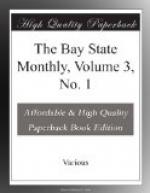In 1698 it had been provided that in case of three years’ absence at sea, when the voyage set out upon was not usually of more than three months’ duration, the man or woman whose relation was in this way parted from him might be considered single and unmarried. In 1838 wilful desertion for five years was added to the then existing causes for absolute divorce, in favor of the innocent party, and in 1850 yet another cause was added by providing that if either party separated from the other and for three years remained united with any religious sect or society believing or professing to believe that the relation of husband and wife is void and unlawful, a full divorce might be granted to the other.
The law remained thus for ten years, or until the adoption of the General Statutes in 1860, when desertion for five years was made ground for granting a divorce to the deserting party also, provided it could be shown that such desertion was due to the cruelty of the other, or in case of the wife, to the failure of the husband to properly provide for her. Divorce from bed and board was also authorized for extreme cruelty, complete desertion, gross and confirmed habits of intoxication, if contracted after the marriage, and neglect of the husband to provide for his wife. Such limited divorces might be made absolute after five years’ separation, on petition of the party to whom the divorce was granted, and after ten years on that of the guilty party. There was no change in these laws until 1870, when limited divorce, a relic of churchly superstition, was done away with entirely in this State, the grounds upon which it had been granted being at the same time made cause for absolute divorce, with the condition, however, that all such divorces should be in the first instance nisi, that is, conditional, to be made absolute after three years in the discretion of the court, and after five years as of right. Prior to this time, in 1867, it had been enacted that all decrees of divorce should be first entered nisi, to be made absolute in six months in the discretion of the court, and this act of 1870 therefore left nine causes for absolute divorce; but in all cases for cruelty, desertion, intoxication, or neglect or refusal to support, the decree must remain conditional for at least three years. Since that date there have been many changes in the statutes, but all in the direction of regulating the entry of the decree, without affecting the causes therefor, except that in 1873, habits of intoxication, even if contracted before marriage, were made good grounds for a decree.
The law of 1841, which remained in force until 1853, forbad the marriage of the party for whose fault divorce was granted during the lifetime of the innocent partner; but in the latter year the court was authorized to allow the guilty party, except in cases of adultery, to remarry; and in 1864 it was provided that even in such cases the guilty one might marry after three years, unless actually tried and convicted of the crime. In 1873 even this restriction of three years was removed, and the law remained so until 1881, when it was enacted that the guilty party in all cases might marry after two years without the formality of applying to the court for leave so to do.




